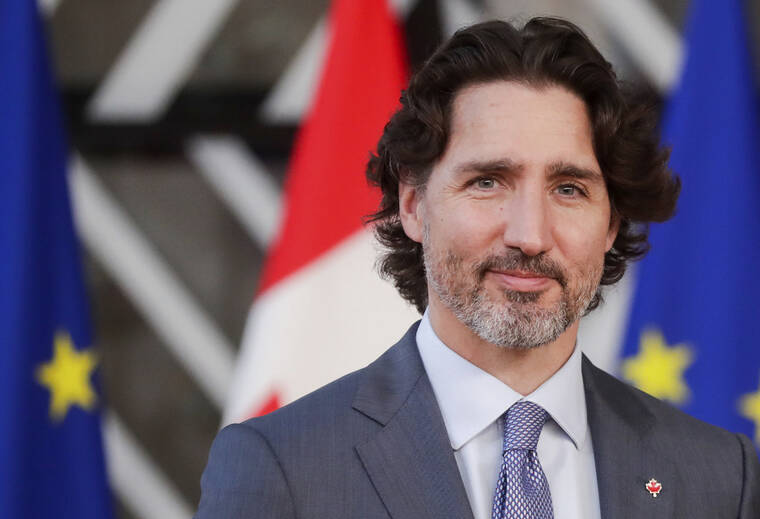Canadian voters put Trudeau’s gamble to the test
OTTAWA, Ontario — It was a political gamble.
When Prime Minister Justin Trudeau of Canada announced a snap election last month — two years ahead of schedule — he thought that his handling of the pandemic would translate into a decisive win, giving his Liberal Party the majority in Parliament that it lost in the last election, in 2019.
In the brief campaign period leading up to the vote Monday, he portrayed the election as a pivotal moment for the country’s history, and for his ambitious liberal agenda.
But instead, there was nonstop grumbling about having an election at all while the delta variant of the coronavirus was straining hospitals in some areas of the country. Trudeau’s opponents consistently characterized his move as a reckless power grab. Last weekend, Erin O’Toole, the leader of the Conservative Party and his chief rival, even called it “un-Canadian.”
Although Canadians have generally approved of Trudeau’s handling of the pandemic, his party’s standing dropped sharply at the start of the campaign. It has remained stuck in a statistical tie with the Conservatives at about 30%.
“I’m wondering if the Liberals, in their minds, are saying: ‘Dang it, why did we — why did we call it?” Kimberly Speers, a professor of political science at the University of Victoria in British Columbia, said before the vote. “If we do end up with another Liberal minority government, how long is it going to last? And then how long is Trudeau going to last?”
Trudeau first came to power in 2015 by presenting himself as a new voice in politics with a new approach and fresh policies. He began that campaign in third place, behind the incumbent Conservatives and the left of center New Democratic Party. Few political experts foresaw his win.
This time around, Trudeau is part of the political establishment. So he focused on telling voters, explicitly or otherwise, that a return to a Conservative government under O’Toole would wipe away his achievements in a variety of areas including gun control, gender equity, climate change, child care, poverty reduction and above all, ending the pandemic and getting Canadians vaccinated.
“Mr. O’Toole won’t make sure the traveler sitting beside you and your kids on a train or a plane is vaccinated, he won’t even make sure his own candidates are vaccinated,” the prime minister said at a campaign rally in Surrey, British Columbia last week. “This is the moment for real leadership. Mr. O’Toole doesn’t lead, he misleads.”
But in O’Toole, the prime minister encountered a different opponent than the Conservative leaders he faced in 2015 and in 2019.
A former air force helicopter navigator and corporate lawyer from Ontario, O’Toole produced a 160-page campaign platform that repudiated many Conservative positions, like opposing carbon taxes, in a bid to broaden the party’s appeal. Similarly, after condemning Trudeau for running up large deficits with pandemic spending, O’Toole’s plan forecast similar budget shortfalls.
During the campaign, he reversed a promise to repeal Trudeau’s ban on 1,500 models of assault-style rifles when it became apparent that it alienated voters who are not core Conservative supporters. He has, however, maintained his opposition to mandatory vaccination and vaccine passports.
“I am a new leader with a new style,” O’Toole, who took over the party just over a year ago, said at the outset of the campaign. “There are five parties but two choices. Canada’s Conservatives or more of the same.”
Like other opponents throughout Trudeau’s political career, O’Toole also chipped away at the prime minister’s personal integrity, reminding voters of the low points in his career.
Among those low points are when the federal ethics commissioner found that Trudeau broke ethics laws by, with his staff, pressuring his justice minister, an Indigenous woman, in 2018 to offer a large Canadian engineering firm a deal allowing it to avoid a criminal conviction on corruption charges.
Last year a charity with deep connections to Trudeau’s family was awarded a no-bid contract to administer a COVID financial assistance plan for students. The group withdrew, the program was canceled and Trudeau was cleared.
“Every Canadian has met a Justin Trudeau in their lives — privileged, entitled and always looking out for number one,” O’Toole said during the campaign. “He’ll say anything to get elected, regardless of the damage it does to our country.”
Trudeau pushed back by saying that O’Toole’s willingness to ditch Conservative policies showed he was the candidate who would say or promise anything to voters.
While many voters eagerly bumped elbows and posed for selfies with Trudeau at campaign stops, his campaign was often disturbed by unruly protests against mandatory vaccines and vaccine passports. One event was canceled out of safety fears; Trudeau was pelted with gravel at another.
Many of the protesters, who sometimes carried gruesome images of Trudeau about to be executed, were members of the People’s Party of Canada, a far-right group led by Maxime Bernier, a former Conservative Cabinet minister who narrowly lost one of that party’s leadership votes.
Trudeau does have a strong political challenger on the left nationally with Jagmeet Singh of the New Democratic Party.
Singh, a lawyer and former provincial lawmaker from Ontario, consistently had the highest approval ratings of all the leaders before and during the campaign. But his personal popularity was not enough to raise his party much above 19% in the polls.
While rarely naming Singh and his party, Trudeau cautioned “progressive voters” who are disappointed in the Liberals not to turn to the New Democrats.
“We are the party with the best progressive plan to keep Canada moving forward,” he said in Vancouver, British Columbia, last week. “And we were the only progressive party that can stop Erin O’Toole and his Conservatives from taking Canada backwards.”


